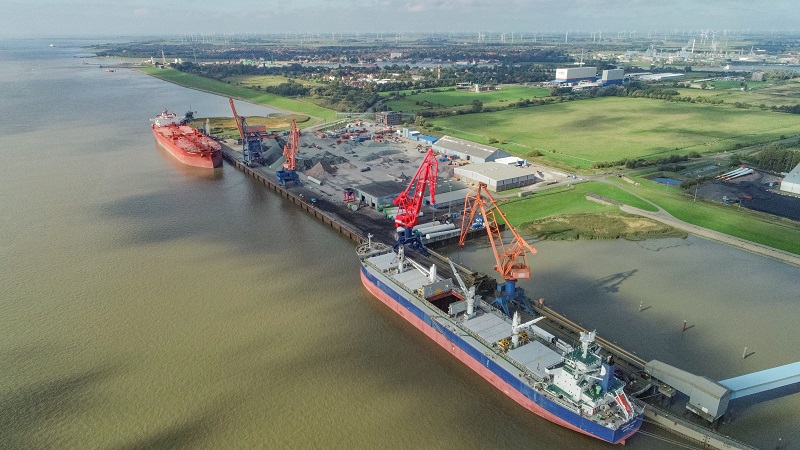Germany: RWE to build green ammonia import terminal in Brunsbüttel
2022-03-21 09:23 Release person:Schindler Logistics
March 18, 2022, by
German energy company RWE AG has unveiled plans to build a terminal for the import of green energy in Brunsbüttel, in an effort to secure Germany’s future energy supply.

As explained, RWE is relying on green ammonia as “the most competitive hydrogen derivative with the highest level of technological maturity”. The plans envisage that ammonia tankers will be unloaded at the new Elbe facility from 2026 and the product will be transported from there by pipeline to the ammonia terminal.
The move comes only a few days after Dutch gas infrastructure company Gasunie and the German state-owned bank KfW signed a memorandum of understanding (MOU) to quickly build the first German LNG terminal in Brunsbüttel.
The new import terminal will be built in the immediate vicinity of the Brunsbüttel LNG terminal.
The project is intended to help facilitate the subsequent conversion of the entire site ready to import green molecules.
According to RWE, this underlines RWE’s aspiration, as a shareholder in the LNG terminal, to pay particular attention to its green conversion. Brunsbüttel can thus become a role model for the decarbonization of industrial society.
“It is now more important than ever to think of climate protection and security of supply as one. That’s what we are doing. On the one hand, we are involved in the forthcoming construction of the first LNG terminal in Germany. On the other hand, we are going to build an ammonia terminal at the site to forge ahead with the import of green molecules for the decarbonisation of industry,” Markus Krebber, CEO of RWE AG, pointed out.
“This flagship project will cover the entire value chain – from import, to conversion, transport and use by industrial customers. The entire site will benefit from this.”
In late February 2022, German Chancellor Olaf Scholz that Germany will build two LNG terminals in the near future in an effort to reduce its dependence on Russian gas. Next to Brunsbüttel, Wilhelmshaven will be the home of the second LNG terminal.
“Russia’s brutal war against Ukraine has made it abundantly clear that we must become independent of fuel imports from Russia. The LNG terminal in Brunsbüttel is an important element in this, as it will increase the capabilities to import gas to Germany,” Robert Habeck, Federal Minister for Economic Affairs and Climate Action, said, welcoming the project.
“Green ammonia as a liquefied hydrogen derivative can make an important contribution to supplying Germany with green hydrogen. At the same time, we can gain important experience with this project for the conversion from LNG to green hydrogen or hydrogen derivatives.”
From as early as 2026, around 300,000 tonnes of green ammonia per year are due to arrive in Germany via the terminal and be distributed to customers. The next step is to build a cracker on a large industrial scale at the terminal to produce green hydrogen on-site as well. This will then be transported to industrial customers via a dedicated hydrogen pipeline.
With this expansion stage, an increase in the volume of ammonia to two million tonnes per year is also planned. The terminal is thus at the beginning of a green import infrastructure that will lead to climate-friendly production processes, RWE said.
Due to its direct access to the North Sea and the Baltic Sea, and its connection to European inland waterways, the Brunsbüttel site is believed to offer “ideal” logistical conditions for the project. Brunsbüttel Ports GmbH is supporting the project with space and as a logistics partner with port infrastructure to unload tankers.
“The plans of German LNG Terminal GmbH for the LNG terminal in combination with the plans of RWE for the ammonia terminal clearly show the attractiveness of the Brunsbüttel port location. Our ports in Brunsbüttel are already important hubs for energy in fossil and renewable form as well as for the chemical industry, so we have many years of experience in handling liquid goods, including ammonia, in our ports. We look forward to good cooperation with RWE,” Frank Schnabel, Managing Director of Brunsbüttel Ports GmbH, said in a separate statement.
To achieve the climate goals, the demand for green molecules will increase strongly in the future. To meet the demand for the decarbonizing industry, from other parts of the world in addition to its own hydrogen production.
The green ammonia terminal is intended to provide an important connecting point for this.
As disclosed, RWE expects investments in the mid three-digit million euro range.
The rapid implementation will require pragmatic action, swift planning and approval processes, short construction timelines as well as high safety standards.
The green ammonia terminal and the transport infrastructure thus create an excellent basis for preparing the site today for the time when energy imports will only be green.




